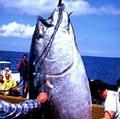 保育人士12日告誡歐洲議會所屬漁業委員會,過去10年來,地中海內的野生黑鮪魚數量已呈現銳減之勢。世界自然基金會指出,黑鮪魚在地中海一些舊漁場中已難尋蹤跡,此外,一份新的資料顯示,此物種正處於嚴重覆沒的險境當中。
保育人士12日告誡歐洲議會所屬漁業委員會,過去10年來,地中海內的野生黑鮪魚數量已呈現銳減之勢。世界自然基金會指出,黑鮪魚在地中海一些舊漁場中已難尋蹤跡,此外,一份新的資料顯示,此物種正處於嚴重覆沒的險境當中。
研究資料顯示,地中海西岸的西班牙巴利阿里群島特別令人憂心,這個地區的漁獲量只剩10年前的15%。在1995年,當地捕獲超過14,000公噸的鮪魚,而今年捕獲量卻銳減至2,270噸。
世界自然基金會表示,地中海的藍鰭鮪魚養殖場也經歷了數量暴跌的情形,其他的徵兆還包括物種數大量減少。
不同於一般水產養殖是將魚類圈養在魚場中繁殖,鮪魚養殖是將野生的鮪魚捕捉圈養。2006年至今,有22,520噸的地中海野生鮪魚被捕獲並圈養,較去年30,000噸減少了25%。
世界自然基金會表示,有6個西班牙的鮪魚養殖場單純因為沒有鮪魚而停止營運。「我們為自己的工作感到憂心,」西班牙傳統鮪魚協會執行長馬奎斯說,「歐盟尚未對科學家再三的警告做出回應,我們只好尋求我們的代表,提醒他們應審慎看待其應負之責任。」
什麼才是最好的作法引起多方討論。藍鰭鮪魚生活在大西洋兩處海岸,長久以來被歐洲漁民大量獵補。
經濟的議題對保育人士來說是項挑戰。在藍鰭鮪魚的需求不斷上升的情況下,鮪魚的買賣是有利可圖的。而地中海的新技術及捕魚方式,特別是鮪魚在養殖場裡養大的方法,造成魚價降低,促使漁民想增加魚獲量以彌補差額。
委員會討論出幾個方法來增加鮪魚數量,包括提高最小體型限制、制訂捕捉的時間限制,及關閉鮪魚產卵區域禁止補釣。世界自然基金會重申關閉生育地及增加體型限制的建議,並且敦促歐盟執委會加強監控捕魚及養殖活動,要求在所有鮪魚棲地和養殖場都有觀察員在場。
Wild populations of bluefin tuna in the Mediterranean Sea have plummeted in the past decade, conservationists told the European Parliament’s Fisheries Committee on Tuesday. Bluefin tuna are almost completely gone from some of the Mediterranean’s oldest fishing grounds, WWF said, and new data indicates the species is in serious peril.
The data show particular concern for the area around Spain's Balearic Islands in the western Mediterranean. Catches in the area are down to just 15 per cent of what they were just a decade ago. In 1995, more than 14,000 metric tons of tuna were caught in the area - that figure fell to 2,270 tons this year.
Bluefin tuna farms in the Mediterranean have also experience substantial decline, WWF said, another sign the species is in sharp decline.
Unlike aquaculture, where fish are bred and reared in captivity, tuna farming uses fish captured in the wild. From 2006's catches of wild Mediterranean tuna, some 22,520 tons have been put in captivity and farmed, a 25 percent reduction compared to 30,000 tons farmed last year.
Six Spanish tuna ranches have already ceased operating altogether because there were simply no more tuna, WWF said. "We fear for our jobs," said Marta Crespo Márquez, director general of a traditional tuna fishing association in Spain. "The EU has still not reacted to repeated warnings from scientists and we are looking to our elected representatives to take their responsibilities seriously."
How to best do that is a source of considerable debate. Bluefin tuna live on the two coasts of the Atlantic, and have been traditionally exploited by European fishermen.
The economics of the issue present a significant challenge to conservationists - the demand for bluefin tuna continues to grow and the trade can be highly lucrative. And new technologies and fishing methods in the Mediterranean, in particular the practice of fattening tuna in fish farms, has caused prices to drop and prompted fishermen to increase catches to make up the difference.
The committee discussed a range of ideas to reverse the decline, including raising the minimum size limits, introducing age limits of catches, and closing tuna spawning areas to fishing. WWF echoed suggestions to close spawning grounds and increase size limits and also urged the European Commission to implement improved monitoring of fishing and farming activities and to call for the presence of observers on board all tuna vessels and in tuna farms.




